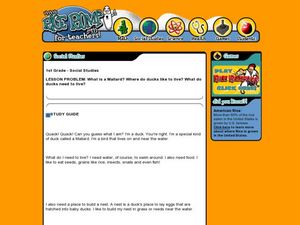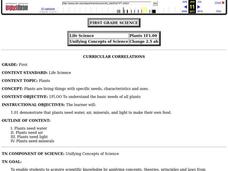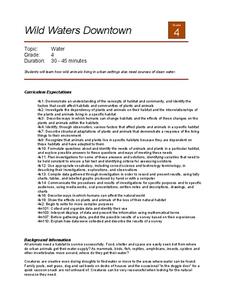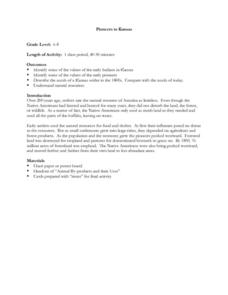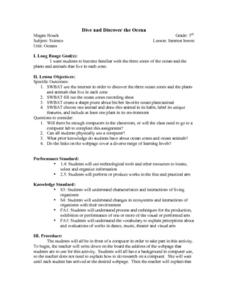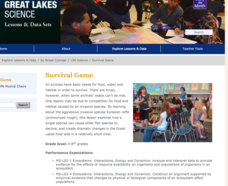Curated OER
Pond 1: Pond Life
Learners work together to investigate familiar and unfamiliar ecosystems. Using the internet, they discover how different organisms use their environment to satisfy their needs. They also examine the relationshiops between organisms...
Curated OER
Mallard Ducks
First graders discuss the habitat and needs of a Mallard duck. For this lesson on ducks, 1st graders examine what a Mallard ducks needs to survive and the wetland habitat that the duck is usually found in.
Curated OER
Diversity and Adaptations of Organisms
Eighth graders discover the difference between extinct and endangered animals and discuss the reasons why this has occured. They identify threatened and endangered animals living in their local area as well.
Curated OER
November Science
Students review that all people, plants, and animals live on Earth. They classify objects found in the environment as living or nonliving.
Curated OER
Plants
First graders explore the specific needs, characteristics, and uses of plants. They discuss the needs of plants as they grow. Students observe plants in various settings as they grow and note the changes they see.
Curated OER
Introduction To Pests
Students investigate common pests and match pests to their respective pictures. In a group discussion, students explore the basic needs of pests and share personal pest stories. They examine common self-protection measures. Using the...
Curated OER
Wild Waters Downtown
Fourth graders investigate how wild animals living in urba settings also need sources of clean water. They discuss the open water issues of West Nile Virus and what happens to urba animals as these poolings area are cleaned up. ...
Curated OER
In Your Own Backyard
Young scholars observe organisms in their habitat and record their observations. They then draw conclusions about the organism's habitat needs and food sources.
Curated OER
Ecosystems
Third graders identify and define an Ecosystem and the basic needs of all animals. They collect pond water in a pickle jar. They observe the organisms that are in the jar to keep an ongoing record of the creatures and their population.
Curated OER
Lets Think About...Plants
Students bring in various vegetables and make friendship soup. They plant seeds and discuss the things plants need to grow and thrive.
Curated OER
Making Community Measurements: Which Plant Part?
Students identify a plant in a given community and make a variety of measurements. They determine how a plant meets its basic needs. In addition to identifying plant parts, they observe seasonal change and compare plants within a community.
Curated OER
Where Do You Fit In?
Students study habitats and then draw a picture of their own habitat which includes the location of food, water, and shelter, and the concept of space. then they cut their habitat in half and discuss how this would affect their lives.
Curated OER
Drink It Up!
Young scholars investigate how the human body needs water by recording their water consumption for a day. They sing a song about drinking water, make and drink Kool-Aid and eat apple slices, and conduct an experiment to determine how...
Curated OER
Our Environment
Students engage in a literature study that helps students to connect with some of the issues of conservation. They list parts of the environment that need protection with the help of a graphic organizer. Then students discuss in groups...
Curated OER
Pioneers to Kansas
Students investigate items for basic survival, needed for survival, and luxury items. They compare what they need to what Indians and Pioneers needed in the 1700's and 1800's.
Curated OER
Dive and Discover the Ocean
Third graders investigate the three zones of the ocean and the plants and animals that live in each zone. Projects produced are shared with classmates in a share circle where the unique features of the animal and zone selected are...
Curated OER
Farming in a Fishbowl: How Ethnic Groups in
Seventh graders research Chinese agricultural needs and practices. They conduct an experiment with aquaculture and germinated rice as they take measurements and apply the scientific method.
Curated OER
It's Okay to Exhale: Photosynthesis and Cellular Respiration
Students will observe the differences between photosynthesis and cellular respiration. Then they observe the links due to climate changes and relate how climate change affects their lives.
Curated OER
Proteins Expressed At Different Stages
Students investigate protein electrophoresis in a lab setting. Full laboratory equipment is needed and safety should be taught. The level of prior knowledge needed to perform lab is high and is ideal for an honors class.
Curated OER
Land Use Issues
Students discover seeds are a source of life. They also label the parts of a seed and examine the conditions which are needed for the seed to start growing. They follow the life cycle of seeds.
Education World
Every Day Edit - Gandhi
In this everyday editing worksheet, students correct mistakes in a short paragraph about Gandhi. The errors range from punctuation, capitalization, grammar, and spelling.
Michigan Sea Grant
Survival Game
Musical chairs may be a classic game, but Ruffe Musical Chairs is a unique lesson on invasive species! Using the time-honored game, pupils role play the behaviors of the invasive fish called Eurasian ruffe. Learning about this aggressive...
Curated OER
My Own Picture Dictionary
Students create a picture dictionary that includes images of people and things that are important in their lives. They identify pictures of people and things that are important in their lives.
Curated OER
Negative Toss
Students discover that they have control over their lives and over which aspects of their lives they choose to concentrate on. They throw away their negative feeling in this activity



